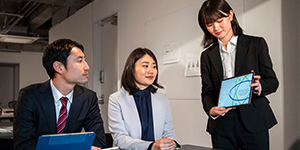Top Job Interview Tips: A Guide for Every Candidate
Navigating the interview process can be challenging, but with effective job interview tips and thorough interview preparation, you can stand out and make a lasting impression. This guide covers essential insights, from preparing for common interview questions to understanding company culture and employee engagement. Following these strategies will help you not only succeed in the interview but also smoothly transition into your new role and workplace.
Understanding the Interview Process
The interview process varies by company but often includes several stages: initial screening, technical or skill assessments, and behavioral interviews. Recognizing what each phase entails allows you to tailor your approach and present yourself as the ideal candidate. Take the time to research and understand the specific interview process of the company where you’re applying. For instance, some organizations focus more on behavioral interviews to gauge if you'll fit into their company culture, while others prioritize skill assessments.
Essential Job Interview Tips for Success
A solid list of job interview tips can significantly increase your chances of success. Here are a few foundational strategies:
• Research the Company: Learn about their values, company culture, and recent achievements.
• Practice Common Interview Questions: Prepare answers to common interview questions to avoid stumbling during the interview.
• Dress Appropriately: Your attire should match the company’s dress code, whether formal or business casual.
• Arrive Early: Timeliness demonstrates your reliability and eagerness for the role.
Preparing for Common Interview Questions
Almost every interview process will include questions that assess both your skills and personality. Some frequently asked interview questions include:
• "Tell me about yourself."
• "What are your strengths and weaknesses?"
• "Why do you want to work here?"
• "How do you handle stress and pressure?"
Practicing these interview questions can help you respond confidently. Try to frame your answers with specific examples that demonstrate your skills and alignment with the company's goals and job expectations.
Focusing on the Candidate Experience
The candidate experience is more than just showing up for an interview. Employers look for candidates who can navigate the interview process professionally. Likewise, candidates should assess how the company treats applicants as it reflects their overall approach to employee engagement and employee training. If an organization values a positive candidate experience, it’s often an indicator of a supportive and respectful work environment.
Importance of Interview Preparation
Thorough interview preparation goes beyond rehearsing answers; it includes researching the organization, understanding the team structure, and preparing insightful questions for the interviewer. Some questions to ask include:
• "What does a typical day look like for this role?"
• "How would you describe the team culture?"
• "What opportunities are available for employee development?"
These questions not only show your interest in the role but also give you insights into job expectations and whether the position aligns with your career goals.
Assessing Company Culture
Company culture refers to the shared values, beliefs, and practices within an organization. During an interview, pay attention to cues about the workplace atmosphere, team collaboration, and employee engagement. Positive company culture often leads to higher job satisfaction, better work-life balance, and opportunities for employee development. You can gain insights into the company culture by asking questions about team dynamics, communication styles, and how the company celebrates achievements.
Discussing Job Expectations
Clear job expectations help you understand the demands of the role and whether it aligns with your skills and goals. During the interview, ask for specifics on tasks, deadlines, and key performance indicators. Understanding job expectations ensures you know what’s required for success and demonstrates your proactive approach to meeting these goals. This discussion can also highlight whether the company invests in employee training and resources to support you in achieving these expectations.
READ MORE for : job interview techniques and strategies
Gauging Team Collaboration
Effective team collaboration is essential in any workplace. During the interview, inquire about the team structure, communication methods, and collaboration tools the company uses. Questions like, “How often does the team meet to discuss projects?” or “What does team collaboration look like here?” can help you understand if the organization supports a collaborative work environment. Employers also value candidates who can work both independently and as part of a team, so emphasize your ability to contribute to a cooperative workplace.
Recognizing the Role of Employee Engagement
Employee engagement measures how invested employees are in their roles and the company. During the interview, observe how the interviewers speak about their team and work environment. Engaged employees are typically more motivated, productive, and satisfied in their roles. Companies that focus on employee engagement often offer rewards, growth opportunities, and open communication channels to support their teams.
Exploring Employee Training Opportunities
Organizations that provide employee training show a commitment to their workforce's growth and success. During the interview, ask if the company offers training programs or supports continuing education. Knowing that the company values employee training means they’re invested in helping you succeed and reach your full potential. Some companies also offer mentorship programs, workshops, and seminars, which contribute to both employee development and career advancement.
Understanding Employee Development Programs
Companies that prioritize employee development create a pathway for career progression and skill enhancement. In the interview, you can ask, “How does the company support employee development?” or “Are there growth opportunities for this role?” Learning about these programs can help you decide if the role aligns with your long-term career goals and provides the support needed to achieve them.
Knowing What to Expect in Performance Reviews
Performance reviews are essential for tracking progress and setting future goals. During your interview, inquire about the frequency and structure of performance reviews to understand how the company assesses and values its employees. Asking questions like, “How often are performance reviews conducted?” or “What is the feedback process here?” shows your commitment to continuous improvement and your interest in aligning with the company’s performance standards.
Emphasizing the Importance of Workplace Integration
Workplace integration refers to how easily new hires are welcomed into the company’s culture and workflow. A smooth workplace integration process ensures that new employees quickly become productive and feel included in the team. Ask about orientation programs, mentoring opportunities, or initial tasks to get a sense of how the company supports new hires. A well-organized workplace integration strategy indicates a company’s dedication to onboarding and retaining its employees.
Enhancing Team Collaboration Skills
Today’s workplaces require strong team collaboration skills, so showcase your ability to work effectively with others. Emphasize experiences where you successfully contributed to team projects, resolved conflicts, or collaborated on problem-solving. Team collaboration is valued by employers and enhances productivity, morale, and innovation within the company.
Preparing for Onboarding and Beyond
The onboarding phase is crucial for long-term employee engagement and job satisfaction. During the interview, ask about the onboarding process to get an idea of how the company supports new hires. Companies that invest in comprehensive onboarding programs typically foster higher employee engagement and create a foundation for successful workplace integration.
Conclusion
Navigating the interview process requires both preparation and an understanding of the company’s values and expectations. By following these job interview tips, you can present yourself as a well-prepared, thoughtful candidate who is genuinely interested in the role.
From researching company culture to discussing job expectations and employee development programs, each aspect of the interview is an opportunity to demonstrate your alignment with the company. Preparation doesn’t end with landing the job; it extends into your new role through continuous employee engagement, team collaboration, and professional growth.
Approach each stage of the process with confidence, curiosity, and commitment to creating a positive impact on your future workplace.





